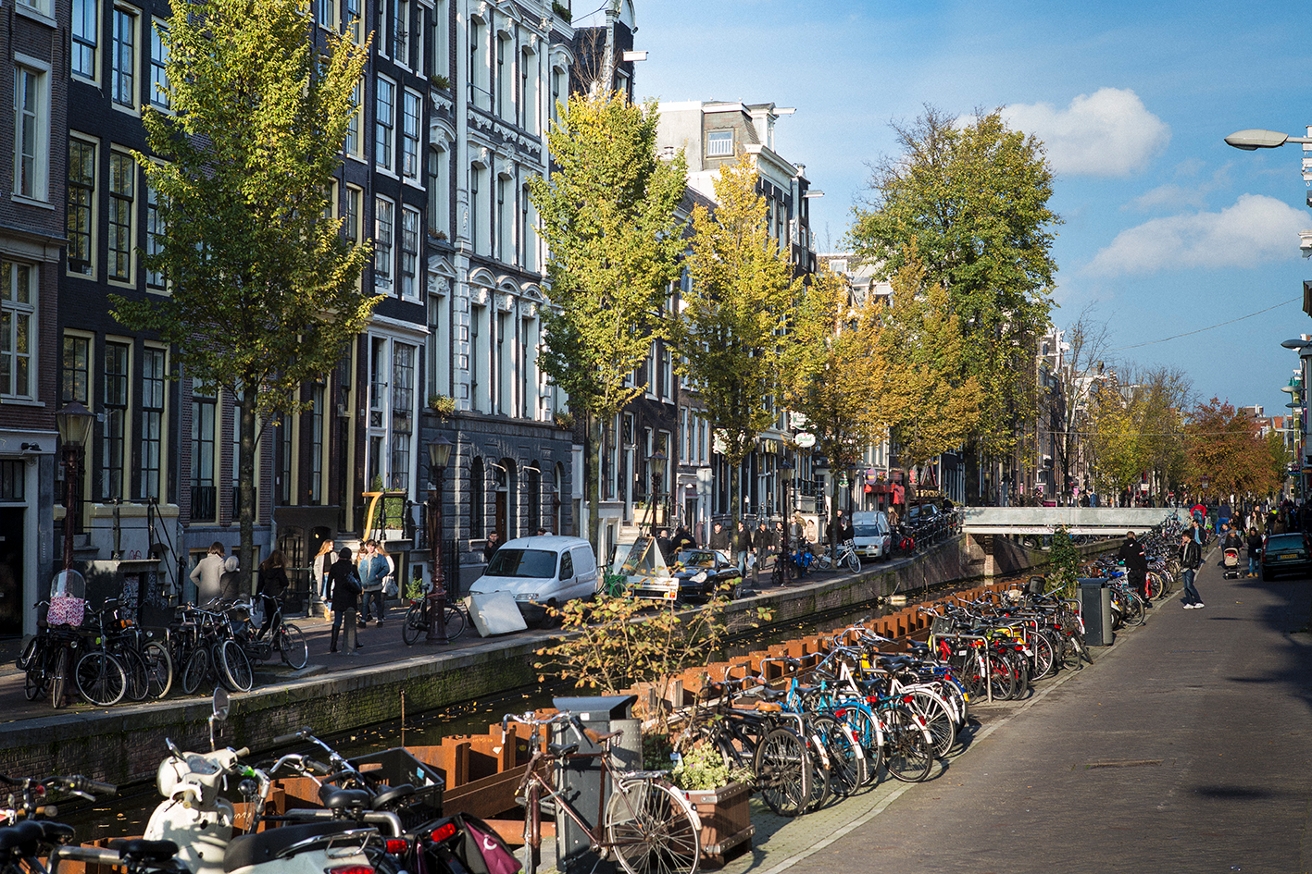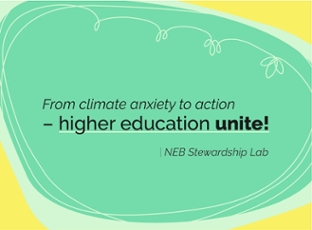How can we shift from climate anxiety to climate action?
Horizon Europe-funded climate neutrality project explores role of higher education in effecting change
7 Feb 2023 16:00 | CommunicationThe Amsterdam University of Applied Sciences (AUAS) is working closely with international partners to translate the European Commission’s ‘New European Bauhaus’ initiative into concrete sustainability actions. On 7 February, AUAS participated in an event focusing on the stewardship role of higher education – how can we foster the individual and collective actions crucial to make European cities climate neutral, beautiful and inclusive?
CrAFt
The project Creating Actionable Futures (CrAFt) is part of the European Union’s New European Bauhaus (NEB) initiative, which aims to develop a new approach to delivering climate neutrality and the European Green Deal. In the CrAFt project, which kicked off last year, three AUAS Centres of Expertise collaborate with an international consortium of universities and cultural organisations. The AUAS’s role is to coordinate the work on the ground in the sandbox cities: Amsterdam, Bologna and Prague, while analysing governance challenges that arise in spatial projects related to NEB values – climate-neutral, beautiful and inclusive.
NEB Stewardship Lab Launch
AUAS has teamed up with U!REKA partner Metropolia University of Applied Sciences and a consortium of higher education insititutions in Europe. The partners hosted the launch of the Lab on 7 February, together with the European Commission Joint Research Centre New European Bauhaus Unit.
The session focused on the theme: How can education play a role in New European Bauhaus?
‘As Europe and the world are facing existential threats of climate change where social and ecological systems are disrupted - urgent actions are needed. Answering these challenges requires swift and decisive action on multiple levels from local to global. The New European Bauhaus (NEB) initiative provides an enabling context for this transition by calling people to imagine and build together a future based on values of sustainability, inclusion and aesthetics.
In this context the new community led NEB Lab project, NEB Stewardship Lab, seeks to enhance and clarify the role of higher education to support the needed societal transition. The project will further co-develop the model of NEB Stewardship , which combines the NEB values to three stewardship dimensions: knowledge, agency and care. This combination draws the attention to capacities needed for effective individual and collective actions pursuing sustainability.’ (quote from Metropolia website)
See more information about the Stewardship Lab on Metropolia’s website.
NETH-ER webinar
At AUAS, Mareile Zuber (Project manager Centre of Expertise for Creative Innovation) and Andrew Switzer (CrAFt project manager and lecturer/researcher, Coordination of Urban Issues) are the main points of contact for NEB. They recently participated in a webinar hosted by NETH-ER, the Netherlands house for Education and Research, during which they discussed the CrAFt project and the opportunities for Dutch researchers in NEB. The webinar "Building the New European Bauhaus: now & in the future" is available below.
AUAS colleagues Mareile Zuber and Andrew Switzer recently participated in a webinar hosted by NETH-ER, the Netherlands house for Education and Research, during which they discussed the CrAFt project and the opportunities for Dutch researchers in NEB.
‘Craft is about taking action and looking at how we can implement NEB. At AUAS we are stress-testing NEB values in urban development projects. The goal is to find scalable examples of NEB projects and related collaboration models. It’s an ideal project for AUAS and practice-based research as it looks at how we can work with the community to make this initiative concrete and scalable,’ says Andrew Switzer.
Student involvement
During the Lab Launch, AUAS students shared their experiences of the NEB initiative so far. Students are closely involved in the project, providing a vital perspective as the future generation of professionals. Working in interdisciplinary teams, they are developing ideas for interventions in different neighbourhoods in Amsterdam based on the NEB principles.
For example, AUAS students in the Future-proof City minor programme worked last semester on a case in Amsterdam’s historical inner city, the Nieuwmarkt neighbourhood, also known as the red light district. They developed concrete ideas for interventions that improve the quality of life in the neighbourhood by boosting greening and aesthetics of the area, biodiversity, inclusivity and more social cohesion.
Mercy Oluokun, an AUAS student in the Master Digital Design programme also recently shared her experiences of working in an interdisciplinary student team as part of the CrAFt project. Read the interview with Mercy here.

About NEB
The NEB Stewardship Lab is a joint effort of Metropolia University of Applied Sciences (Finland), University of Turin (Italy), IADE - Universidade Europeia (Portugal), NABA - Nuova Accademia di Belle Arti (Italy), Amsterdam University of Applied Sciences (Netherlands), Cyprus Institute (Cyprus) and Green Growth Generation (Italy). The group of coordinators is working towards the common goal of nurturing the transition from climate anxiety to NEB stewardship and fostering the actions required for positive change.
About CrAFt
The CrAFt project involves three Centres of Expertise at the Amsterdam University of Applied Sciences: Creative Innovation, Urban Governance and Social Innovation, and City Net Zero. In addition, four research groups are collaborating in this project: Building Transformation (professor Frank Suurenbroek), Civic Interaction Design (professor Martijn de Waal), Coordination of Urban Issues (professor Stan Majoor), Creative Media for Social Change (Tamara Witschge). The international consortium is led by the Norwegian University of Science and Technology. The project runs from May 2022 until May 2025.
Contact
Do you have questions about AUAS's involvement in NEB? Contact the AUAS NEB Stewardship Lab Coordination Team members, Marleen Henny and/or Mareile Zuber. You can also follow the project on LinkedIn.

